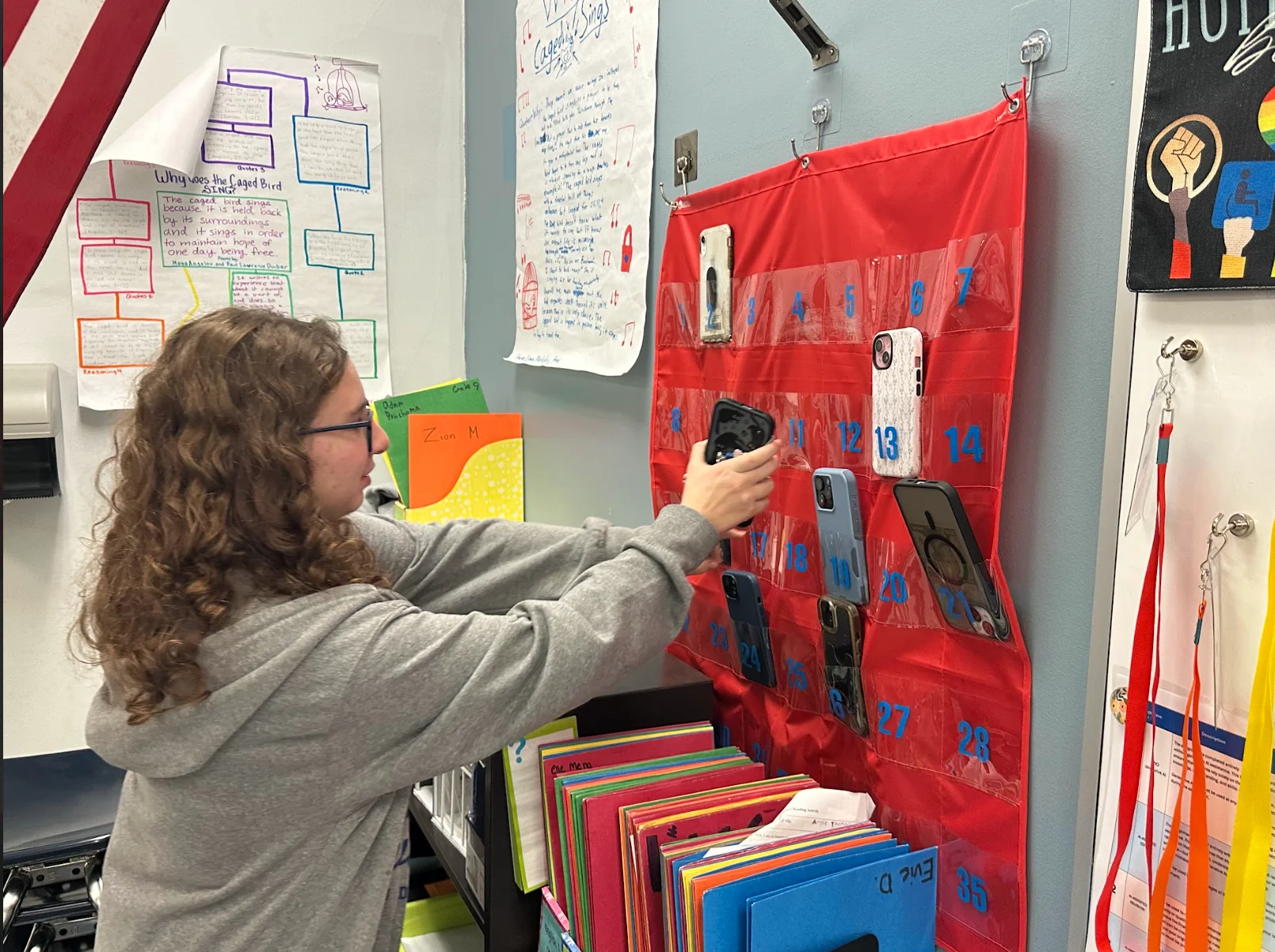PPS administration considers phone restrictions or ban for 2026-2027 school year
November, 2025
Paula Kutin ’27 puts her phone in a phone pouch during Joyce Jones’s period 5 health class.
This year, PHS has seen a rise in phone pouches — pockets where students are required to put their phones in before and throughout classes. The implementation of phone pockets has risen along with growing concerns about phone usage from the community; pushed by community feedback and research, discussions in the district for a concrete phone ban or restriction policy are underway.
“We're hoping to work collaboratively to come up with a policy that students understand and can get behind. The research [shows that] getting off ... your phone and really focusing with your teachers ... is what is important,” said Susan Kanter, a Board of Education member on the policy committee. “There’s a collaborative project that we hope will happen in the next few months with the administration.”
The potential phone ban, according to Dr. Michael LaSusa, Superintendent of Princeton Public Schools, could take one of two forms. In a bell-to-bell ban, all high school students would be required to store their phones in a compartment when entering the building and pick them up at the end of the day. The more lenient option would be a consistent ban on phone use during instructional time in all classes, permitting students to access their phones during lunch or study hall. The district purchased the phone pouches that now hang on the walls of all classrooms last year, though it is currently up to teachers to decide how strictly to enforce the policy.
“I feel that it's better for more students to not have access at all to their phones any minute of the school day,” said LaSusa. “But I also think that in terms of logistics, management, and resources, it's much easier and more pragmatic in certain ways to have a [phone] restriction only on classroom instructional time.”
In addressing concerns that a phone ban could endanger students if they need to contact someone, such as their parents, during an emergency, LaSusa cited Jonathan Haidt’s book “The Anxious Generation,” which argues that phones have fundamentally harmed the mental health of teenagers.
“Jonathan Haidt makes the case that students are safer in an emergency without access to their phone because they should be listening to the teachers and following instructions,” said LaSusa. “In my last district, we did the type of restriction where students still could access their phone in an emergency from [phone] pockets.”
LaSusa also cited the New Jersey Department of Education's (NJDOE) policy guidance regarding phone bans. On October 1, 2025 the NJDOE launched the state’s first phone ban grant, which provides extra funding to schools if they enact a bell-to-bell phone ban.
“[NJDOE] recommends, essentially a bell-to-bell ban completely, and then, short of that, some type of restriction on cell phones; so with the state guidance and with all that we know now about cell phones and how distracting they can be, I think it's likely that the [Princeton Board of Education] will adopt some type of district level policy,” said LaSusa.
Principal Cecilia Birge has said that she’s received positive feedback from teachers regarding the phone pouches, but also said that she would support a phone ban if approved by the district.
“If there are significant offenses, and then that causes disciplinary action, then that gives building administration more authority to act upon it. For that reason, I support it,” said Birge.
Daniel Spitkosky ’27 is skeptical that a bell-to-bell phone ban would significantly improve academic performance.
“If I had no phone, just my computer to work on an assignment, and I really was not interested in working on the assignment, I think I would find methods to procrastinate on the computer despite not having my phone. I think that not having it would potentially increase my productivity, but not to an enormous extent,” said Spitkovsky.
Though a final decision is likely still several months away, LaSusa remains confident in the success of any potential phone ban.
“I think that if there were to be a bell-to-bell [ban] ... instituted [at PHS], there'd be more social interaction among students, and students would come to appreciate that type of policy,” said LaSusa. “If the policy was more lenient and it was just a restriction during classroom time, I think most students would really have almost no problem with that at all, and I don't think that it would materially affect the culture of the building. I think either type of policy will actually only probably enhance the culture in the building.